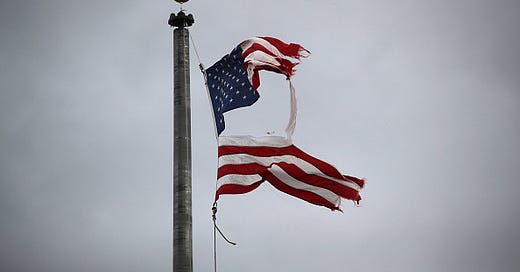Universal Health Care is Patriotic
And when we have it, we will be better and prouder citizens
Health care is a human right, as I showed in the first post in this series. Freedom and health work together, as I argued in the second. I promised ten ways that universal health care would make us more free, and I delivered them in the third and fourth posts.
In this final post on the subject, I want to close this series of posts about health and freedom by discussing two more values: security and patriotism.
In this country, we are constantly told that we have to choose between freedom and security. But what exactly is meant by security? What would actually make Americans feel more secure, and be more secure, in their daily lives?
Our most tender point is our health and the health of our loved ones. It is so essential to our security that we hardly dare speak of it. And yet we should speak of it, because it can be treated, and that treatment can be improved by policy. If we are healthy, we are secure. Even more: if we are confident that we will be treated when we are ill, we feel more secure about life.
And patriotism? What does it have to do with health? Everything. One of the reasons that we are so polarized is all of the unnecessary sickness, physical and mental, that flows through our society. Worse still for our relations with one another is all of the pointless anxiety we suffer as a result of the unpredictability and insufficiency of care.
Patriotism means concern for the country, and for our fellow citizens. In a commercial system, Americans are in competition with one another for care, and we know it, even if we do not talk about it. If we can, we try to buy our way to better access. If we are in the hospital, we hope (if we have fancy insurance, in our worse moments) that all the money we are paying makes a difference. Or we wonder if all the money that someone else is paying is getting them a better room or a better doctor. It might well be.

But the problem goes deeper. Those of us who (mistakenly) think we have good insurance are making a relative judgement. Our insurance is only good in the sense that it is less bad than that of someone else, or less bad than having no insurance at all. In other words, our whole sense of having access to care is built upon the knowledge that others are being denied it.
The inequality is not just in the system, but in our minds and souls. That is no way to build a country. And the moral wound is entirely unnecessary. There is no reason to deny people care.
Solidarity and patriotism are arguments for universal health care. And if we had universal health care, we would find it easier to express solidarity, to be patriotic. If we had a system in which we all had access, we would not be so morally torn, and could more easily see our fellow patients and fellow people, as fellow Americans.
Looking ahead, universal health care would make it easier for our children, and their children, to believe that they belong to one society, to one country. That would be a good thing.
Indeed, if we pass universal health care, we would soon find that this is something to be proud of, as a nation.




I like these statements: “Solidarity and patriotism are arguments for universal health care. And if we had universal health care, we would find it easier to express solidarity, to be patriotic. If we had a system in which we all had access, we would not be so morally torn, and could more easily see our fellow patients and fellow people, as fellow Americans.”
Solidarity is something we need to talk more about. It is based on what brings us together. If we have solidarity, as Snyder says, we can also be patriotic. Patriotism can happen if we have solidarity. Solidarity is defined as “unity or agreement of feeling or action, especially among individuals with a common cause; mutual support within a group.” So having a “common cause” such as healthcare that supports us should engender that in people. I say “should” because, sadly, how you say it or ask about it will matter to some people. What approach is the best to take to get people to join us in solidarity?
Whatever people think about Israel, its founders created a universal healthcare system before it even declared its independence from the British Empire. The more that aspects of any place are universal among its population, the more solidarity is fostered.